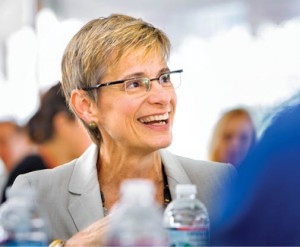
PHOTO: Robert Barker/UP
The Cornell Faculty Renewal Fund in the latest philanthropic campaign was designed to enable the University to hire 100 new faculty members by 2015, with half the funding coming from philanthropy and half from Cornell. Our Sesquicentennial Faculty Fellows, hired through this initiative, and other recently appointed junior faculty are already proving the wisdom of that investment. Junior faculty in science and technology have had especially notable successes this year.
Ten junior faculty earned prestigious Early Career Development Program (CAREER) awards from the National Science Foundation, and three others won National Institutes of Health Director’s New Innovator Awards. These honors bring recognition to the recipients’ work and also allow them to move their research and teaching to the next level of excellence and consequence.
Eve Donnelly, MS ’04, for example, is an assistant professor of materials science and engineering and a Dale R. Corson Sesquicentennial Faculty Fellow. She is using her CAREER award to identify and predict how changes in bone tissue composition that occur in osteoporosis will affect bone fracture behavior. C. Lindsay Anderson, assistant professor of biological and environmental engineering and the Norman R. Scott Sesquicentennial Faculty Fellow, is using her CAREER award to develop an efficient and effective framework for improving the electrical power system—including by finding better ways to integrate renewable sources of power and manage changes in demand. With his CAREER award, Michael Niemack, assistant professor of physics, is building a new instrument to study the Cosmic Microwave Background, faint radio signals that are thought to originate from the beginning of the universe. And NIH New Innovator Melissa Warden, assistant professor of neurobiology and behavior and a Miriam M. Salpeter Fellow, is imaging brain activity in freely behaving animals to investigate the neural circuit dynamics underlying the onset of depression.
‘Well-supported assistant professors are likely to go on to even greater things as they mature into mid-career faculty stars.’
Well-supported assistant professors are likely to go on to even greater things as they mature into mid-career faculty stars. All three of our Howard Hughes Medical Institute Investigators—Hening Lin, professor of chemistry and chemical biology; Olga Boudker, professor of physiology and biophysics at Weill Cornell Medicine; and Michelle Wang, professor of physics and of cell and developmental biology—as well as our newest MacArthur Fellow, William Dichtel, began their Cornell careers as assistant professors. As mid-career faculty they now have the support and confidence they need to push the boundaries of knowledge in their fields.
One way to attract outstanding junior faculty who will thrive in our unique academic environment is to bring them here as postdoctoral fellows. NIH New Innovator Matthew Paszek ’02, assistant professor of chemical and biomolecular engineering, came back to campus as a Kavli Institute for Nanoscience Postdoctoral Fellow, working with faculty mentors from two different Cornell units, and was then successfully recruited to the faculty. Such interdisciplinary postdoctoral fellowships are an effective way to identify and successfully recruit rising junior faculty stars, and with funding from philanthropy could be expanded to other areas at the University.
Cornell does well in competing for the limited pool of federal research dollars, but it often takes the investment of University “seed” funds in visionary, exploratory projects to establish the foundation for collaborative, interdisciplinary research. Once initial results are obtained, these projects can be highly competitive in obtaining external support.
For every dollar spent by the Atkinson Center for a Sustainable Future (ACSF) in support of interdisciplinary research, for example, about $7 of follow-on external research funding comes to Cornell. ACSF’s Academic Venture Fund, through which junior professors and other faculty members can secure funding, supports original, multidisciplinary research that is potentially game-changing.
In 2015, it funded eleven projects with awards totaling $1.2 million. Projects ranged from measuring the effectiveness of a new polymer for purifying water in developed and developing nations to documenting how much money energy-saving “retrofits” of existing homes actually save each year. We’re grateful to David Atkinson ’60 and his wife, Pat, for their vision in establishing this fund as part of their commitment to ACSF.
As we celebrate the successful conclusion of the campaign, we will build on the momentum we have generated to expand our support for start-up packages for junior faculty hires, especially in particular areas of preeminence for Cornell research. We must generate more seed and exploratory project funding, and support cross-cutting postdoctoral positions and graduate fellowships that can enhance our ability to recruit top-tier faculty and enable them to pursue transformative research at Cornell. Our students, the nation, and the global community will all benefit from that investment.
— President Elizabeth Garrett


